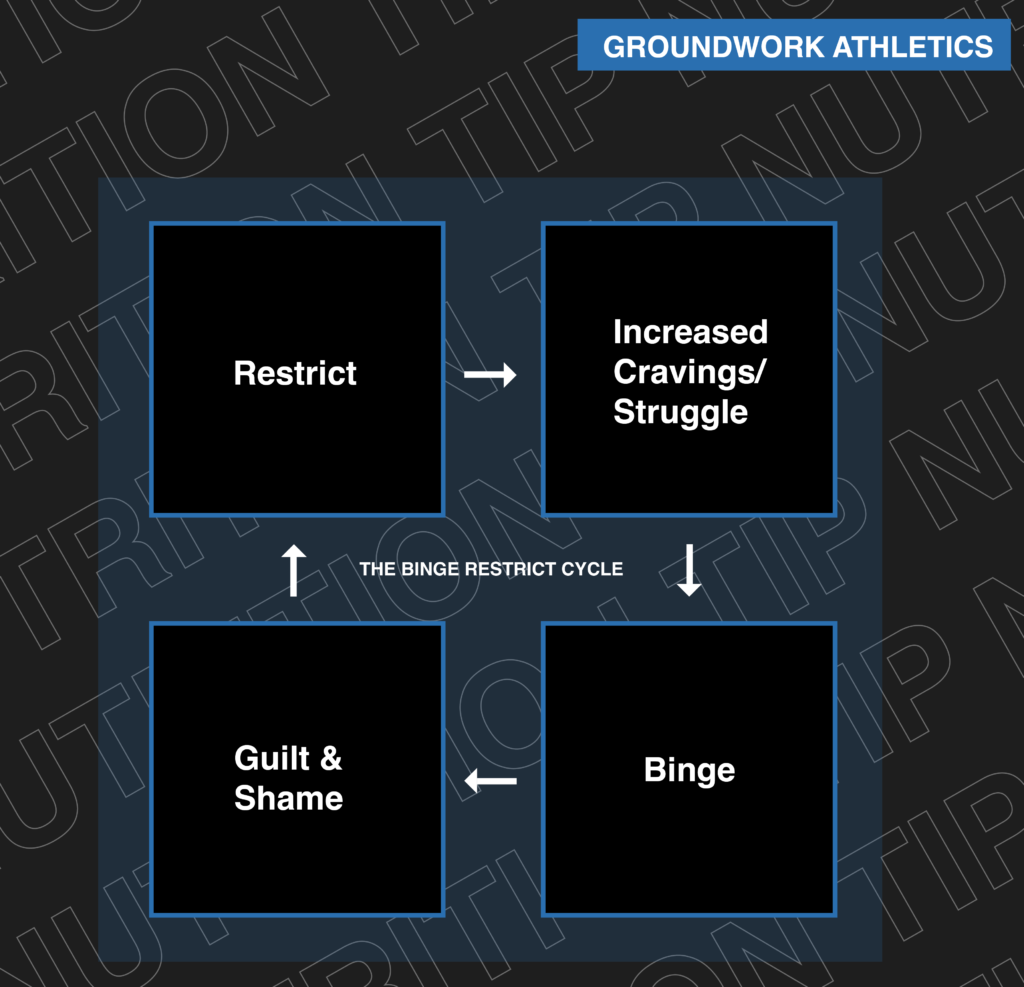The Binge/Restrict Cycle
Binge eating can often be misunderstood or misrepresented, so before we break down the binge/restrict cycle, let’s qualify what a binge really is. There are some telltale behavioural and emotional signs that may indicate binge eating such as, but not limited to:
- Feeling a loss of control over your eating
- Eating even when you’re full or not hungry
- Eating rapidly during binge episodes
- Eating until you’re uncomfortably full
- Frequently eating alone or in secret
What is the binge/restrict cycle?
The binge/restrict cycle is often the result of both physiological and psychological depletion. In other words, the psychological stress and exertion of willpower caused by excessive restriction can cause an over-correction in the form of binge eating. The cycle may start at any of these points, but we’ll start with the following:
Restrict: Often the first step in an attempt to “diet”, or a compensatory decision after a prior binge, you eliminate all of the “bad” foods from your daily diet; eating only the healthiest foods you can think of, and in extremely small amounts. This may last for a day, maybe even a week, but it’s entirely unsustainable, which leads us to the next stage.
Increased Cravings/Struggle: After a bout of extreme restriction or “dieting”, the cravings start to kick in. It could start as something small, but the more you resist, the harder it becomes.
Cravings increase, the struggle increases, sometimes leading to obsessive thoughts about food and eating, subsequently leading to an episode of binge eating.
Binge: Following a period of restriction, resistance and cravings, something triggers a bingeing episode; whether it be emotional distress or insatiable hunger from overly restricting for a period of time. A bingeing episode is usually classified as a period of uncontrollable eating. Once the binge ends, there are usually subsequent emotions of guilt and shame.
Guilt or Shame: Once the binge is over, strong emotions of guilt and shame start to flood in and can be overwhelming. As these are unpleasant feelings, efforts are made to restrict once more in a bid to not feel this way again, ergo the cycle starts over.
Productive steps to change
Some of you may know this story all too well, perhaps you’ve noticed a similar pattern in your own life or someone close to you. The binge-restrict cycle is more common than you may think, and you are certainly not alone if this is something you find yourself struggling with. Luckily there are some steps you can take to make a real change, such as:
- Fight the initial instinct to restrict yourself following a binge episode.
- Try adding some structure by planning your meals and snacks.
- Avoid labeling foods as “good” or “bad”, this might mean allowing yourself to give into your cravings more regularly than you do currently.
- Try keeping a food journal to better understand your triggers.
When to seek help
Binge-eating problems can vary in their course from short-lived to recurrent or they may persist for years if left untreated. If you are experiencing any symptoms of a binge-eating disorder, consider talking to your medical care provider or a mental health professional. If you’re apprehensive about finding treatment, try talking to someone you trust about what you’re going through. A family member, friend, or other loved one can help you take the first steps to successful treatment of binge-eating disorder.
